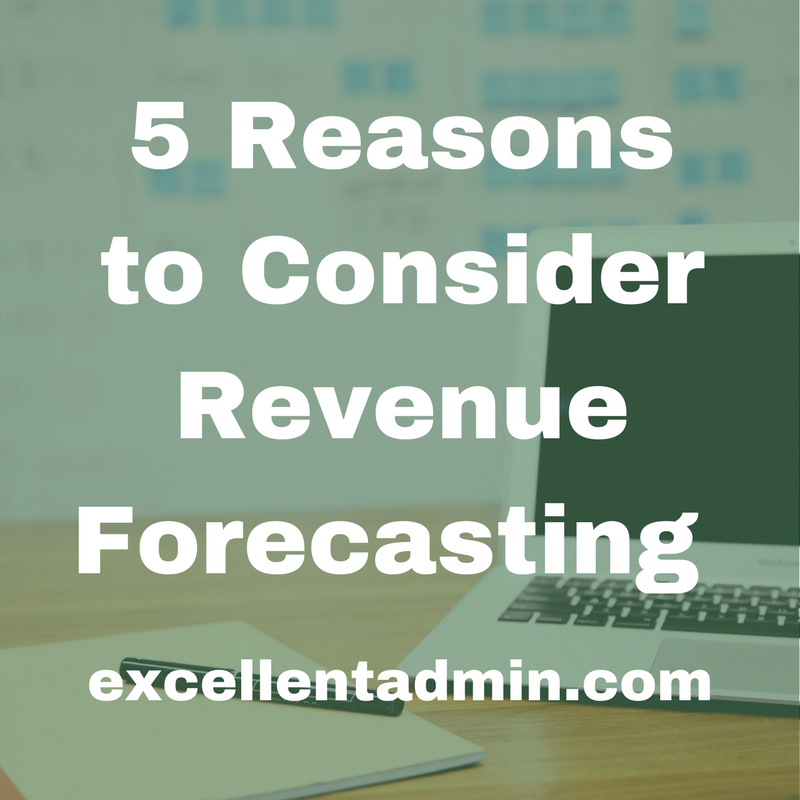It’s no secret that every small business needs to keep a budget in order to track and manage expenses. But how do you make decisions about your budget? for example, how many employees you can afford to hire or how much you can spend on advertising? In order to prepare an accurate budget, you first need to develop a revenue forecast for your business. A forecast is an educated prediction for the upcoming year about how much money your company will likely bring in, so that you can estimate what you can afford to spend, how much must be paid in taxes, and what your profit margin will be. Keep reading to learn more about why you should consider revenue forecasting for your business.
1. Forecasting Eliminates Guesswork
By tracking income and expense over the course of the fiscal year, you can get a better idea of how much you will make in revenue, how much you will need to spend on overhead, inventory and payroll, as well as how much you will need to pay in taxes for the next year.
2. Managing Payroll Cost
By keeping track of projected sales on a day-to-day basis, this can give you a better idea of how many employees you need to schedule on a particular day in order to be well staffed enough keep up with customer demand. Conversely, it can also give you an idea of when the slow periods are, so that you can adjust payroll hours accordingly. Just as being understaffed can potentially limit profits during busy hours, having too many employees on the clock during lull times, will result in people essentially getting paid to stand around and do nothing, and that cuts into the bottom line.
3. Managing Inventory
You can also use your forecast to determine how much inventory you need to keep on hand during any given period. This is especially important in the food service industry because many items that must be kept on hand are perishable, so ordering too much inventory and having it spoil can be costly. On the other hand, not having enough of a particular item can prevent you from meeting your numbers, and can in some cases cause customers to stop patronizing your business, and instead choose to frequent your competition. By forecasting your revenue, you can determine exactly how much product you need to keep on hand, and thereby eliminate unnecessary expense in the form of waste or lost sales.
4. Reduce Utility Cost
Another great benefit of revenue forecasting is that it allows you to keep the costs of operating your business low. In addition to the cost of inventory and payroll, the cost of utilities can stack up quick. By forecasting, you can determine if there are days or hours during the week when it may be more profitable to close the business than it is to keep lights, and A.C. running. This is also true for some seasonal businesses such as landscape supply companies, or other companies whose product or service is provided to customers on a “per order” basis.
Sometimes it’s a better financial decision to close up shop during slow sales periods, rather than spend money that you are not making back to keep the business up and running.
5. Eliminates Tax Time Surprises
Forecasting your revenue also allows you to estimate how much you will need to pay in taxes at the end of the fiscal year. By using previous years numbers as a model, you can predict about how much you will owe the IRS on your income. It’s also important to take into consideration the amount of deductible expenses that you can claim on your return. By tracking purchases, and itemizing your deductions accordingly, you can reduce your tax liability, meaning you reduce the amount of income that you are responsible for paying taxes on. When it comes time to file in april, you will have a better understanding of where your finances lay in regards to profit vs. expense. By keeping track of your income and tax deductible expenses, you can prepare financially to make payments ahead of time, and you won’t be caught off guard by the amount that you owe, and you won’t have to reach into your own pockets to make the required payment to the IRS.
Conclusion
The benefits here are clear, and this is an instance where they far outweigh the potential cost. By forecasting your revenue you can effectively increase profits, and reduce the costs associated with running your business.
If you have any comments or questions, leave your thoughts in the section below.
